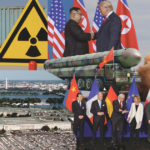**Updated May 16, 2022** By Samuel M. Hickey We will update this page as new questions and information arise, and you can submit questions to be answered by tweeting at @nukes_of_hazard. Iran Deal Specifics What did the Iran deal accomplish? Under the Iran deal, why can’t Iran build a secret nuclear bomb? Will sanctions relief allow […]
Restored Iran Deal May Be in Reach
Research Analyst Samuel Hickey wrote a piece in Arms Control Today laying out the current status of negotiations to revive the Iran nuclear deal. European and U.S. negotiators have thrown cold water on indications that the Iranian nuclear deal could soon be restored. EU foreign policy chief Josep Borrell told the European Parliament on March […]
Iran, IAEA Agree on New Safeguards Plan
Research Analyst Samuel Hickey wrote a piece in Arms Control Today discussing a new agreement between Iran and the International Atomic Energy Agency that would bring Iran back into compliance with its nuclear verification commitments. Iran and the International Atomic Energy Agency (IAEA) have agreed to adopt a “practical and pragmatic approach” to resolving outstanding […]
Fact Sheet: The Nunn-Lugar Cooperative Threat Reduction Program
As the Soviet empire collapsed, it became clear that an emergency situation was dangerously close. 30,000 nuclear weapons and a vast weapons production complex were spread over four sovereign states. Some 40,000 tons of chemical weapons and a large biological capability were also present. In response, the United States devised a program to consolidate, secure […]
Could Russia derail the Iran Nuclear deal?
Research Analyst Samuel Hickey appeared on a TRT World panel discussing Russia’s role in a potential revived Iran nuclear deal.

